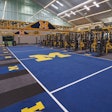Copyright 2017 Gannett Company, Inc.
All Rights Reserved
USA TODAY
There are times Mom and Dad really don't know what's best. Like, say, when it's safe for their child to return to play after a concussion.
Fortunately, North Carolina lawmakers appear to have realized that. With furor building over proposed legislation that would have allowed parents to make decisions for which they are not equipped and that could jeopardize their children's lives, one of the co-sponsors told USA TODAY Sports on Tuesday that the bill would soon be amended.
"That's going to be changed," promised state Rep. Greg Murphy, who is also a physician. "It's not necessary, because I don't believe parents are medical professionals and they are not qualified to make such decisions.
"I'm not sure why that was included, but it's definitely going to be removed."
Given some of the shenanigans in North Carolina politics lately, it's worth keeping an eye on legislators until the necessary edits are actually made to House Bill 116. Because parents, no matter how well-meaning, do not have the expertise to make decisions of this magnitude.
There is much we don't know about repetitive head trauma and the long-term damage it can cause, particularly with young athletes. There is no set recovery time, either, with severity of the injury, physiology and personal history all playing roles.
But one thing researchers do know is that returning to play too soon can leave a child vulnerable to additional injury, even death. And while most parents would never do anything to purposely put their children at risk, we've all seen those moms and dads with an unhealthy investment or interest in their kids' athletic careers.
Giving them the power to rush their sons or daughters back on the field when a young body or brain is still healing is not only senseless, it's reckless.
"Parents are very competitive in many venues of competitive sports. Sometimes those decisions are made -- and I've seen them made previously," said Jason Mihalik, co-director of the Matthew Gfeller Sport-Related Traumatic Brain Injury Research Center at the University of North Carolina.
"At the end of the day, everyone should be a part of (discussions about) a student-athlete's health and safety, and that includes parents," Mihalik added. "But certain decisions that need to be made can impact the life of a student-athlete, and those decisions are best left to licensed medical professionals."
The surprising part of all this is that North Carolina has one of the most comprehensive return-to-play laws in the country, one that has been held up as a model for other states.
Named for two high school football players who died after suffering head trauma on the field, the Gfeller-Waller Concussion Awareness Act prohibits kids from returning to play without the written clearance of a physician, neuropsychologist, athletics trainer, physician's assistant or nurse practitioner. It also requires schools to have formal emergency action plans in the event of serious injuries or medical conditions.
"I strongly feel parents should be involved in medical decisions involving their child," Mihalik said. "To do the scenario where a parent is exclusively able to (clear a child), without even seeking health care for the child, is something I personally can't support."
The uproar over making parents concussion experts has also detracted from the other, laudable aspects of HB 116. In addition to concussions, the Student Safety in Athletics bill would require all coaches to be trained in CPR and prohibit kids who suffered heatstroke or heat exhaustion from returning to play without medical clearance.
It also would require parents to acknowledge before each season that they had been given educational information on sudden cardiac arrest, heat illnesses and head trauma.
But perhaps most important, HB 116 would create a statewide database of all catastrophic illnesses, injuries and concussions suffered during an athletic activity. It would be cataloged by age, gender and sport, providing researchers with a wealth of information.
"We can't act on data unless we have it," Murphy said.
And you can't make decisions that will impact the health and safety of a child if you don't have the training and expertise.
Being a parent requires making tough choices every single day. Deciding whether your child's injured brain has recovered enough to let him or her return to the playing field should not be one of them.
Read More of Today's AB Headlines
Subscribe to Our Daily E-Newsletter
Terms and Conditions Privacy Policy































